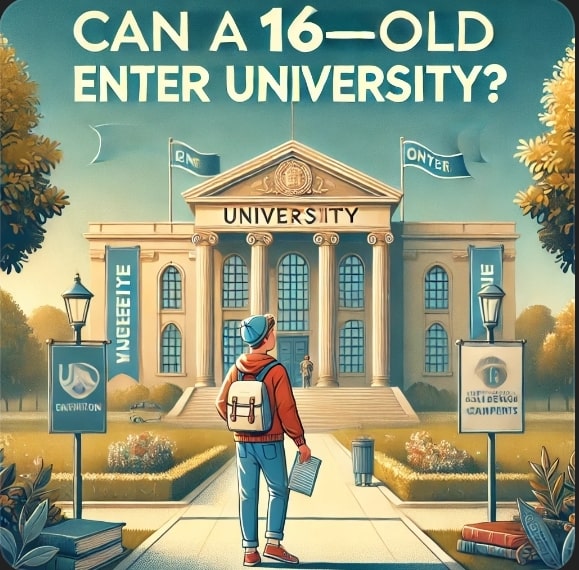Can a 16-Year-Old Enter University? A Comprehensive Guide
Overview of Early University Admission
Early admission to university is a possibility that ambitious young students may consider. Across the globe, several institutions provide pathways for academically exceptional teenagers to commence their higher education journey ahead of the usual schedule. This practice, while not commonplace, opens up a realm of academic and career advancements for eligible young scholars.

Eligibility Criteria for Young Applicants
Academic Excellence
Universities that accept younger students typically require demonstrable academic excellence. This is often evidenced by outstanding grades, top percentile scores on standardized exams, and strong recommendations from educators. Potential candidates must exhibit a level of maturity and intellectual capability that reassures the university of their readiness to handle advanced coursework.
Supplemental Assessments
Apart from standard admissions criteria, younger applicants might be subjected to additional assessments. These could include interviews to assess maturity and readiness, psychological evaluations, and tailored entrance exams. These stringent measures ensure that only the most suitable candidates are admitted.
Support Systems for Younger University Students
Academic Advising and Mentoring
Recognizing the unique challenges faced by younger students, universities often provide robust support systems. Dedicated academic advisors and mentorship programs help these students navigate their early years in higher education. These supports are crucial for helping young students adjust socially and academically.
Social Integration Programs
Social integration is vital for the well-being of younger students in a predominantly older environment. Universities might offer special programs such as peer groups, clubs, and activities designed to integrate these students with their peers, ensuring a well-rounded university experience.
Potential Challenges and Solutions
Emotional and Social Maturity
One of the significant challenges young students may face is the disparity in emotional and social maturity compared to their older peers. Universities address this by providing access to counseling services and workshops that promote emotional intelligence and resilience.
Balancing Academic and Personal Growth
Maintaining a balance between rigorous academic demands and personal development is crucial. Universities can facilitate this by offering flexible course loads, opportunities for extracurricular involvement, and periods of academic leave if necessary.
Case Studies of Successful Young Entrants
Highlighting several case studies, we can observe the trajectories of young individuals who have thrived in university settings. These narratives often share common themes of strong familial support, personal drive, and an unwavering commitment to academic excellence.
Conclusion
The admission of a 16-year-old into university, while not standard, is entirely feasible under the right circumstances. With appropriate supports in place, these young scholars can not only succeed but excel in their higher education pursuits.
Frequently Asked Questions: Can a 16-Year-Old Enter University?
1. Can a 16-year-old legally enroll in a university?
Yes, a 16-year-old can legally enroll in a university if they meet the institution’s admission requirements. This typically involves having completed high school or possessing equivalent qualifications like the GED, along with meeting any specific entry requirements set by the university.
2. What are the academic requirements for a 16-year-old to enter university?
The academic requirements for a 16-year-old to enter university are generally the same as for older students. This includes having a high school diploma or its equivalent, passing entrance exams (if applicable), and meeting any course-specific requirements. Some universities might also require letters of recommendation and a satisfactory GPA.
3. Are there special considerations for underage students in university?
Many universities offer support systems for underage students, including mentorship programs, counseling services, and special accommodations for their age. It’s important for underage students and their guardians to inquire about these supports during the application process.
4. How common is it for 16-year-olds to start university?
While it’s not the norm, it’s increasingly common for academically advanced 16-year-olds to start university early. These students often come from backgrounds where they have accelerated their education through advanced placement classes, homeschooling, or early graduation.
5. What challenges might a 16-year-old face in university?
A 16-year-old in university might face several challenges, including social integration, handling the academic rigor, and managing their time effectively. Emotional and developmental maturity can also be a concern, as the university environment is typically designed for adults.
6. Can a 16-year-old live on campus?
Policies on underage students living on campus vary by university. Some institutions may allow it with parental consent and proper arrangements, while others might require underage students to live at home or in specially designated housing.
7. What are the benefits of entering university at 16?
Entering university at 16 can offer numerous benefits, including academic challenges that match the student’s abilities, opportunities to engage with diverse ideas and people, and a head start on achieving career goals. It also allows the student to complete their education earlier, which can be beneficial professionally and financially.



















+ There are no comments
Add yours